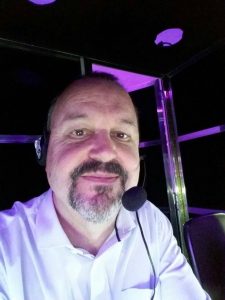
As we gear up for the ATA’s Annual Conference in Washington DC this October, let’s learn more about the speakers we’ll get to see during sessions associated with the Portuguese Language Division!
Below you will find a summary of their presentation(s), as well as a brief interview.
 P-5 Pitfalls of Interpreting between Portuguese and English
P-5 Pitfalls of Interpreting between Portuguese and English
David Coles
(Saturday, 11:15am-12:15pm; Advanced; Presented in: English)
Drawing on many years of experience providing feedback to interpreting students, the speaker will examine cultural, phonetic, lexical, and grammatical pitfalls that can render English>Portuguese interpreting unidiomatic. The emphasis will be on discovering the underlying meanings behind the lexico-grammatical “veil” of the source language to find a mode of expression that’s as natural as possible in the target language. Examples will be taken from classes and real-life events. Reference will be made to sources of study material and to practice routines that enable such enhancements to take root.
P-6 Self-Recording, Transcribing, Language Analysis, and Self-Enhancement: Painstaking, but Rewarding
David Coles
(Saturday, 2:00pm-3:00pm; Advanced; Presented in: English)
Patterns, habits, and errors in simultaneous interpreting can be revealed, analyzed, and tackled by the relatively simple expedient of self-recording. The time, patience, and commitment needed to self-transcribe, in addition to the often sobering “findings” that are unearthed, tend to prevent interpreters from exploiting this systematic look at themselves in order to improve. The “words on the page” are a kind of hidden realm wherein grammatical complexities (such as cleft sentences, which are widely used by English-speakers) can be anticipated, deconstructed, and neutralized, thus avoiding hesitation and unsatisfactory renderings. Three different self-enhancement projects will be demonstrated during this session.
The Portuguese Language Division is proud to present David Coles as this year’s Guest Speaker at the ATA Annual Conference in Washington DC. David is a seasoned interpreter and translator. He is a native English speaker who has lived in various countries, including India, England, Uganda, Portugal, and mainly in Brazil, where he decided to put down roots thirty-two years ago.
If you want to learn more about David’s background and career, read the excellent interview with him done by PLD member Naomi de Moraes for the Medical Division Newsletter, Spring 2003, pp. 13-16, which you may read here.
Last week we had a chance to meet with David and to see how excited he is about his participation at the Conference. See what he has to say:
“What I am expecting from the Conference:
I have never been to an ATA Conference. So my thoughts are little bit like the Commander in Stingray: “Anything can happen in the next half-hour.” Seriously, I would like to meet new colleagues, catch up with the latest ideas in the literature on interpretation and translation, check out some software, sit in on talks about any number of topics, both for written and for spoken translation, in any language, and steal a few ideas about sources of practice material for the interpretation courses that I co-teach in Brazil. And wander around Washington DC a little, in what I hope will be some glorious autumnal weather. I may well visit some musical instrument shops…
What you can expect from my presentations:
The presentation for the Portuguese Language Division, about pitfalls in translating into English, will, I hope, offer some reminders about what to look for when self-reviewing. And remind people (if they learned English as a second language rather than acquiring it as a child) that simplicity, accuracy, and, indeed, elegance in the target language English can lie beneath the surface complexity of the source-language texts in Portuguese. One thing I will say, for example, is “Don’t forget what you learned about the sentence-position of adverbs” at the intermediate level, when students learn to make sentences like “I usually go the movies on Saturdays” (between the subject-pronoun and the verb/auxiliary)—because it is quite commonplace for writers in Portuguese to front the adverb and separate it from the sentence by a comma (e.g. Normalmente, eles pagam com cartão), which would be an odd-sounding or “marked” word-order in English.
My other talk, to the Interpreters Division, will be about what can be learned from self-recording, and will also be practical, I hope. However, the take-home lessons will be somewhat more personalized, and I am not necessarily expecting to make converts to the practice. I merely hope to offer the results of what was for me an interesting exercise and which might be for the listeners too, each in his or her own way, and, of course, not necessarily involving English or Portuguese, the languages of my experiment.
I have also been engaged in gathering my thoughts on twenty years of teaching interpretation (rather than translation, although I did that too). My aim is to produce a book, albeit only a limited-edition samizdat affair, distilling a range of insights, if I may call them that, (i) on a theoretical approach to interpretation itself, (ii) on the phonological challenges in the English and Portuguese languages, (iii) on grammar, (iv) on certain aspects of vocabulary, and (v) on an approach to teaching interpretation. It is fairly slow going, this book-writing business! One practical consequence will be to enable myself to declutter my computer, to gather all my thoughts into one place, and, hopefully, provide some guidance to interpreters and coaches. I don’t intend to submit it for formal, academic peer review for publication by, say, a university press. I have no desire to make a mark on the academic sphere of interpretation teaching, but I fondly imagine that one or two of my findings are not all that harebrained. Enfim, it’s a vanity project!!”
Although David has chosen to talk about interpreting, much of what he has to share with us is applicable to translating in general as well. We therefore encourage all of our members to attend David’s sessions in DC.

Leave a Reply